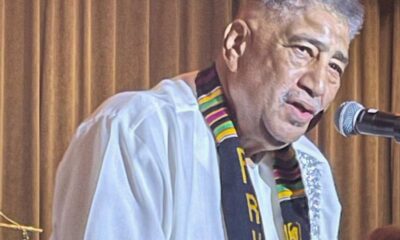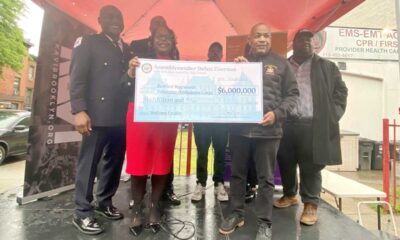Editorial
Response to a Reader
Reprint from November 4, 2010
To the Editor:
I love the Bedford-Stuyvesant community. My family and I are newcomers and would like for our local politicians to stop using and abusing the words “black community.” Yes, we know Bed-Stuy is mostly black, but that will not be the case for very long. We wish you would include others like Hispanics, whites, and Asians as well when it comes time to speak about improving the community. We are all doing what we can in these tough times.
This community will come to fruition when all people are mentioned as an important part of this community. We live in New York City, a place surrounded by all different groups, does Al Vann really believe Bed-Stuy will continue to be mostly a black community.
Wake up sir, we all care about the neighborhood and want to live next to decent people without regard to their racial makeup. When you mention the fact that blacks can’t let go of Bedford-Stuyvesant, you create tension between different groups.
That is not what our politicians should be doing. Why not just refer to all community members of Bed-Stuy simply as that, because that is what we are.
Steven,
Brooklyn
Dear Steven,
As far as I can tell, you do not love the Bedford-Stuyvesant community. What you love about Bedford-Stuyvesant are its amenities: the transportation infrastructure, the tree-lined streets, and the brownstones. There is the Brooklyn Academy of Music, the Brooklyn Children’s Museum, Prospect Park, the Brooklyn Botanic Gardens, and the Brooklyn Museum, all within a nice walk; that is what you love. The inhabitants, however, are an entirely different matter.
Bedford-Stuyvesant has had many ethnicities pass through it over the years. Now, it is a mostly African-American community with roots stretching back over two hundred years. The Weeksville Houses, still standing, date from 1840. Bridge Street African Wesleyan Methodist Episcopal Church was organized in 1766 and incorporated in 1818. So yes, that sentence fragment was right. You are a newcomer. Beyond that, you suffer from what we can call Post-Traumatic Slave State Syndrome (PTSSS).
Dr. Joy DeGruy has written about Post-Traumatic Slave Syndrome, the transgenerational transfer of emotional trauma arising out of the terror needed to hold African-Americans in chattel slavery for 400 years. This period also produced a state apparatus as well as a state of consciousness in European Americans arising out of hundreds of years of superiority and relating to African Americans as property. What you are experiencing here is an example of PTSSS, a condition brought on by vestiges of slavery that are with us every day.
For example. There are weekly and daily publications in many languages all around you, all referring to their “community” of Polish-Americans, Russian-Americans, Korean-Americans, Pakistani-Americans, and many more. They are of no interest to you because you do not speak their language.
And if Our Time Press was written in Swahili, you would also pay it no mind. It is written in English because Africans were captured, transported as cargo and sold as property to provide the cheap mass labor needed to convert raw land into the economic engine that jump-started this United States.
As a part of that, the slave system took away the languages of the Africans and substituted its own, giving slave owners access and control over the Africans’ thoughts. And now, as you continue that legacy of eavesdropping, you are overcome with umbrage that the property has misbehaved, but you take a gleeful solace in projecting that we won’t be here very much longer.
It is impossible to know which of the echoes of slavery you feel will take us out but given the combinations and the multitude I can understand your feeling of confidence. There are the foreclosures resulting from racist predatory lending driving people from their homes and depression-era unemployment plus a 50% dropout rate, all intertwined with emotional distress, most obviously acted out in self-hating crimes of gunfire and dysfunction at home.
As African-Americans work to cure these problems, you feel empowered to object, which were it not for the PTSSS diagnosis, would be an astonishing impertinence. But I guess such malevolent arrogance is not unexpected, and the rewards for stealing another’s language, the ability to meddle, keep coming in.
Of course you are right again, it is nice to live next door to decent people. A person I would have liked to have lived next to was the family of Louisa May Alcott. In the biography Louisa May Alcott: The Woman Behind Little Women, Harriet Reisen writes this about the capture of Louisa’s family hero, the militant abolitionist John Brown: “We are boiling with excitement here,” Louisa wrote to Alf Whitman a few weeks after the raid, “for many of our people (Anti Slavery, I mean) are concerned in it.
We have a daily stampede for papers and a nightly indignation meeting of the wickedness of our country & the cowardice of the human race. I’m afraid Mother will die of spontaneous combustion if things are not set right soon.” Later, after a harrowing description of Louisa’s experiences in a Civil War hospital was this: “The night before she had celebrated the Emancipation Proclamation by leaping from her bed at midnight and racing to the window to add her own cheer to the hollering and singing in the streets of the embattled nation’s capital.
She waved her handkerchief to a crowd of black men gathered below and returned to bed to savor the bursts of firecrackers and choruses of ‘Glory, Hallelujah’ that sounded all night.” These passages and many others show me that Miss Alcott and her people, “Anti Slavery, I mean,” are people I’d like to live next to. And I know their descendants and legacies are here also, luckily offsetting those such as yourself.
(It would be better if abolitionist fire still burned with indignation, decrying white control of African-American education and demanding fairness in city contracting, but the vote for Obama showed there were still some embers there and maybe they just have to be fanned.)
You, however, are a different matter. Your words on African-Americans remaining in Bedford-Stuyvesant, “that will not be the case very long,” spring from a different source, one captured by Claude McKay in his poem “The Lynching”:
Day dawned, and soon the
mixed crowds came to view
The ghastly body swaying in the sun:
The women thronged to look,
but never a one
Showed sorrow in her eyes
of steely blue;
And little lads, lynchers that were to be,
Danced ’round the dreadful thing
in fiendish glee.
And here you are, the “little lads” heir all grown-up and smugly snuggled in your white privilege, a critic of African-American conversations to combat the remains of the slave experience, strengthen our community, and be a full partner in the future.
The fact that you find the methods and manner objectionable is heartening. I take it to mean we are on the right track, and as a sort of mile marker on our journey, I ask a favor of you: please let us know when you become apoplectic, and then we’ll know we’re almost there.
David Mark Greaves













